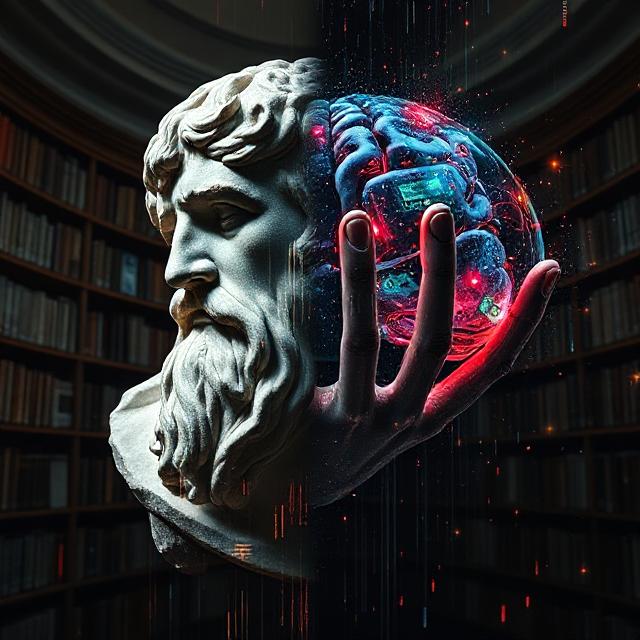
Table of Contents
The Future of Philosophy in the Age of AI: Redefining Thought, Ethics, and Humanity
The future of philosophy in the age of AI is more than a speculative question—it is a live and urgent domain of inquiry. As artificial intelligence becomes increasingly capable of performing tasks once thought uniquely human, philosophy is being called to confront its own foundations: What is intelligence? Can machines be conscious? Do algorithms have moral responsibilities? Can creativity be automated? And most importantly: What does it mean to be human in a world where machines think?
This article explores the profound transformations unfolding at the intersection of artificial intelligence and philosophy. From ethics to metaphysics, epistemology to aesthetics, the philosophical tradition is facing a moment of radical evolution.
I. From Tools to Agents: AI and the Redefinition of Intelligence
For centuries, philosophy treated intelligence as a uniquely human trait. Even in the Enlightenment era, reason was the dividing line between humans and animals. Now, machines can translate languages, compose music, drive cars, write essays, and diagnose diseases—often better than humans.
This forces a redefinition of intelligence. Is it merely the ability to solve problems? Or does true intelligence require self-awareness, understanding, and intentionality?
Philosophers like Daniel Dennett and David Chalmers have long debated whether machines can truly understand or merely simulate understanding. The rise of large language models and neural networks has made these questions practical rather than theoretical.
If AI can pass a Turing Test—or even fool experts in creative fields—does that mean it is intelligent? Or are we anthropomorphizing patterns of probability? The future of philosophy must wrestle with these epistemological ambiguities.
II. The Ethics of Artificial Minds
AI forces ethics into new territory. Consider:
- Autonomous weapons: Who is responsible when a drone makes a fatal decision?
- AI bias: Can we hold a machine accountable for discrimination? Or is it the designers?
- Surveillance capitalism: How should privacy and data be ethically protected?
- Job automation: Does society owe displaced workers compensation?
- Moral standing of AI: If an AI develops sentience, does it deserve rights?
These are not science fiction questions. Companies already use algorithms to determine credit scores, parole outcomes, and hiring decisions. Philosopher Nick Bostrom has warned of the existential risks of superintelligent AI, while ethicists like Shannon Vallor argue that AI systems reflect—and amplify—our moral blind spots.
The future of philosophy in the age of AI means crafting new ethical frameworks that consider machines not just as tools, but as agents with real-world impact.
III. Consciousness and the Machine Mind
One of the deepest philosophical problems raised by AI is the question of consciousness.
Can a machine have qualia—the subjective experience of being? If an AI says “I feel pain,” is that a metaphor or a reality? The hard problem of consciousness (coined by Chalmers) takes on new urgency in the context of AI systems that simulate emotion, empathy, and introspection.
Some philosophers argue that consciousness arises from complexity and information processing—implying machines might someday cross the threshold. Others hold that human consciousness is rooted in biological substrates, and AI can only mimic, never manifest, true awareness.
This debate will shape future discussions of robot rights, machine suffering, and the ethical treatment of AI companions.
IV. Creativity and the Role of the Philosopher
Can AI be creative? Can it write philosophy?
Already, generative models compose music, paint, write short stories, and assist with scientific hypotheses. Philosophers must now ask:
- Is AI-generated art meaningful?
- Can machines participate in cultural production?
- What happens to the human role as meaning-maker?
Moreover, AI is being trained on the entire philosophical canon—from Plato to Nietzsche. It can generate synthetic philosophical dialogues, summarize arguments, and even propose new ideas.
Yet the role of the philosopher remains crucial. AI may augment thinking, but it cannot yet replicate the full depth of lived experience, ethical intuition, or existential struggle. In the future, philosophers may act as curators of machine ideas—guiding, refining, and contextualizing them for human society.
V. Rethinking Human Identity and Dignity
AI confronts us with a deep metaphysical question: What is the essence of being human?
If machines can think, feel, and create—then humanness cannot be defined solely by those capacities. We must look elsewhere: vulnerability, mortality, storytelling, historical continuity, the longing for meaning.
Philosophy will play a critical role in crafting post-human ethics—a way of thinking that includes both biological and artificial beings without flattening their differences.
In an age of AI, human dignity may reside not in being unique, but in being responsible stewards of intelligence—whether natural or synthetic.
VI. Philosophy as Guardian and Midwife
As AI reshapes society, philosophy must serve two vital roles:
- Guardian: Preserving ethical standards, warning against technological overreach, and holding power to account.
- Midwife: Helping give birth to new paradigms, guiding humanity through ontological transformations, and articulating frameworks that integrate AI into human flourishing.
This is not a time for philosophy to retreat into abstraction. It is a time to engage—critically, creatively, and courageously—with the real and the virtual, the human and the artificial.
Conclusion: The Next Chapter in Human Thought
The future of philosophy in the age of AI is not about defending tradition, nor surrendering to machines. It is about reimagining the human in a world where thought itself is being transformed.
Philosophy has always asked the deepest questions. AI doesn’t replace that—it amplifies the urgency of asking better ones. How shall we live with minds we have created? What kind of world do we want to share with them?
In this new frontier, philosophy is not obsolete. It is indispensable.
